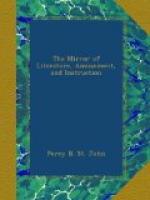* * * * *
MISCELLANIES
* * * * *
RELIGIOUS FORTUNE TELLING.
The Sortes Sanctorum, or Sortes Sacrae, of the Christians, has been illustrated in the Classical Journal.
These, the writer observes, were a species of divination practised in the earlier ages of Christianity, and consisted in casually opening the Holy Scriptures, and from the words which first presented themselves deducing the future lot of the inquirer. They were evidently derived from the Sortes Homerica and Sortes Virgilanae of the Pagans, but accommodated to their own circumstances by the Christians.
Complete copies of the Old and New Testaments being rarely met with prior to the invention of printing, the Psalms, the Prophets, or the four Gospels, were the parts of holy writ principally made use of in these consultations, which were sometimes accompanied with various ceremonies, and conducted with great solemnity, especially on public occasions. Thus the emperor Heraclius in the war against the Persians, being at a loss whether to advance or retreat, commanded a public fast for three days, at the end of which he applied to the four Gospels, and opened upon a text which he regarded as an oracular intimation to winter in Albania. Gregory, of Tours, also relates that Meroveus, being desirous of obtaining the kingdom of Chilperic, his father consulted a female fortune-teller, who promised him the possession of royal estates; but to prevent deception and to try the truth of her prognostications, he caused the Psalter, the Book of Kings, and the four Gospels to be laid upon the shrine of St. Martin, and after fasting and solemn prayer, opened upon passages which not only destroyed his former hopes, but seemed to predict the unfortunate events which afterwards befel him.




